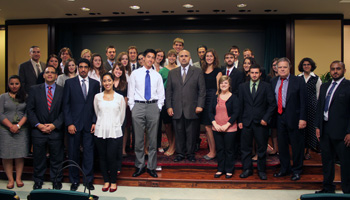Arabia, the Gulf, & the GCC Blog
The “Arabia, the Gulf, and the GCC” blog features insights and analysis from the National Council on U.S.-Arab Relations as well as information about the Council’s programs, projects, events, and activities. Founded in 1983, the National Council is a non-profit, non-governmental, educational organization dedicated to improving American awareness, knowledge, and understanding of the Arab region.
Gulf in the News – April 11, 2013
Billionaires Prince Alwaleed bin Talal, Bill Gates Team Up to Defeat Polio Source: Saudi – US Trade Group
Gulf in the News – April 10, 2013
Peace Envoys From Taliban at Loose Ends in Qatar Source: The New York Times (Read full story) When
Gulf in the News – April 08, 2013
Doha conference endorses strategy to rebuild Darfur Source: Gulf Times (Read full story) … Representatives of donor countries
Gulf in the News – April 5, 2013
Influence of Iran, Brotherhood on GCC states Source: The Peninsula (Read full story) … There is confusion among

NCUSAR’s 2012 Washington, DC Summer Internship Program Recap
The National Council on U.S.-Arab Relations’ Model Arab League/Arab-U.S. Relations Youth Leadership Development Program has been linked for
Gulf in the News – April 3, 2013
Custodian of the Two Holy Mosques performs funeral prayer for Prince Badr bin Abdulaziz Al Saud Source: Arab

Council Chronicle Vol. 6, No. 3 (Summer-Fall 2012) Now Available
The National Council on U.S.-Arab Relations is pleased to provide the eighteenth edition of the Council Chronicle, the Council’s
Gulf in the News – April 1, 2013
Saudi Prince Bader Bin Abdul Aziz dies Source: Al Bawaba News (Read full story) The Saudi Royal Court announced on
Gulf in the News – March 29, 2013
Whither GCC-US Relations? Source: Gulf Research Center (Read full story) The US-GCC relationship appears to be at a

Model Arab League Update – March 2013
The National Council on U.S.-Arab Relations’ Model Arab League program saw the successful completion of two Models during
Gulf in the News – March 27, 2013
Arab summit issues Doha Declaration Source: The Gulf Today (Read full story) … It also strongly condemned the

NCUSAR Organizes & Escorts a Delegation of Naval Academy Midshipmen on a Study Visit to the UAE
The National Council on U.S.-Arab Relations, in coordination with the Emirates Center for Strategic Studies and Research (ECSSR),
